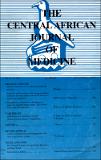| dc.description.abstract | Objectives: To examine the relationships between dehydration and body fluid shifts and the effects of ingesting water or oral rehydration solution or no fluid during and after exercise in the heat [mean (SE)] temperature, 40.5 (0.66)°C and 32 (3.7)% humidity.
Design: PRE and POST three hours exercise comparative study.
Setting: Zimbabwe National Army Wafa-Wafa Training Camp, Kariba, Zimbabwe.
Subjects: 18 male soldiers volunteered to be studied during and after a 20 km (three hour) jogging/walking exercise in full kit.
Main Outcome Measures: Body mass, total body water, extracellular water, intracellular water, plasma, osmolality, plasma sodium, and volume changes compared using paired t-test.
Results: Total body water decreased by 4.9 (0.38) 1 (p<0.02) in soldiers exercising without fluid, 1.5 (0.3) 1 (oral rehydration solution), 2.4 (0.8) 1 (water). Extracellular water decreased by 3.6 (0.3) 1 (p<0.05), 1.3 (0.2) 1, 1.7 (0.3) 1, and intracellular water decreased by 1.3 (0.1) 1, 0.2 (0.01) 1, 0.7 (0.01) 1 respectively in thesegroups. Plasma volume/decreased by [mean (SE)] 16 (1.4)% on no fluid, three (0.3)% on oral rehydration solution, five (0.3)% on water. Plasma osmolality increased significantly from 285 (1.0) to 301 (2.3) mosmol.kg'1 (p<0.001) in subjects exercising without fluid and from 283 (2.0) to 291 (0.7) mosmol.kg1 (p<0.02) in subjects taking oral rehydration solution. No significant increases were observed when taking water only.
Conclusions: During dehydration, total body water loss was derived from both fluid compartments but extracellular water contributed the most. Effective rehydration depends on adequate replacement of electrolytes lost from each fluid compartment. Water alone may not provide adequate re hydration. | en_GB |


